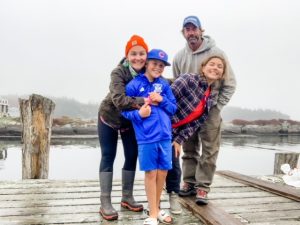Mental Health and Fishermen
By Brie Weisman, Occupational Therapist
Also published by Commercial Fisheries News August 2021
If you or someone you know is having suicidal thoughts, call the National Suicide Prevention Lifeline: 800-273-8255
Maine FishAbility: Fishing & Mental Health Issues
Imagine working with an untreated broken arm. The pain is excruciating, your efficiency may be dramatically reduced. Your safety and perhaps the safety of others is compromised. A smart crew will insist you stop work and seek medical treatment, returning only after your injury is addressed.
Imagine instead that you’ve suffered an invisible wound. Your crew might still see something’s not right. Maybe you’re distracted, forgetting steps you’ve done 1000 times before. Maybe you’re overwhelmed by fatigue, anger quickly. Again, your productivity suffers, and you’re likely a safety risk. Would your crew suspect you have a treatable condition, and insist you seek treatment before returning to work?
Mental health issues (MHI) are as real as physical health issues. In fact, given the choice between a broken arm and depression or anxiety, many who’ve experienced both would choose the former. Not only are MHI real, but they are also commonplace. Nearly half of us experience an MHI in our lifetime; one in twenty adults experience one each year, most commonly depression, anxiety, or a post-traumatic stress injury (PTSI).
It’s just as big a mistake thinking that MHI will heal themselves as it is thinking a broken arm will. Pain and lasting damage may result from either. Depression and anxiety can lead to diabetes, and heart disease. Without proper treatment, mental health illnesses may result in behavioral changes, even deadening emotions–inhibiting interactions with loved ones, friends, and coworkers. Overall resilience deteriorates.
Symptoms of MHI can include:
- Feeling sad or down
- Confused thinking/reduced concentration
- Excessive fears or worries, extreme feelings of guilt
- Extreme mood changes
- Withdrawal from friends, activities
- Tiredness, fatigue, insomnia
If you experience any of these habitually, ask your physician to refer you to a healthcare professional. If you or someone you know is having suicidal thoughts, call the National Suicide Prevention Lifeline: 800-273-8255

Keeping It Local
Monique Coombs, Director, Community Programs for Maine Coast Fishermen’s Association (MCFA), wife, and mother of fishermen.
What is MCFA’s mission?
Restoring Gulf of Maine fisheries, sustaining Maine fishing communities for future generations, and creating programs to maintain thriving waterfronts.
What are the fishing community’s most common mental health issues?
It’s an isolating, dangerous occupation with falls overboard, boats sinking, and perpetual job insecurity. Depression, anxiety, stress, and anger all impact fishermen.
How do fishermen deal with stress?
Often, by working harder. And, like any stressful industry, substance abuse is a concern.
What do you like most about your work?
Working with fishermen and supporting coastal communities. I like advocating for people, and find MH and wellness issues incredibly interesting.
What do you like least about work?
The bureaucracies we deal with. There’s a lot of regulation of fisheries.
Has there been much change to the fishing industry since you started?
The rate of change has been exponential. Climate change and warming waters make predictability hard. The resources and opportunities to help fishermen adapt haven’t kept pace.
What are your dreams for the industry?
To see regulations and policies that address the plight of the fisherman more directly. FarmAid was created for farmers. I’d like something similar for fishermen.
What’s the one thing you can’t leave the dock without?
My phone, to take pictures. And crackers, so I don’t get seasick.
Do you have a favorite piece of equipment?
The Bluetooth speaker on my kid’s boat–music makes work fun.
